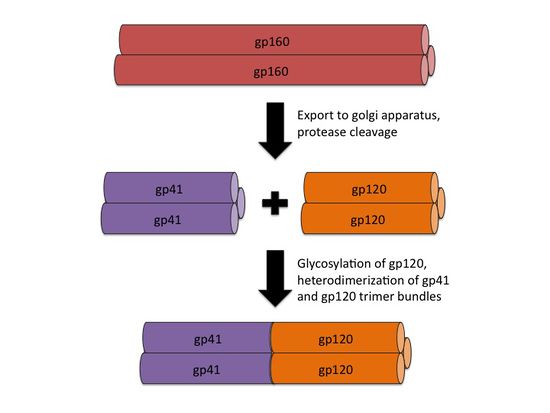HIV Envelope and Cell Fusion: Difference between revisions
From MicrobeWiki, the student-edited microbiology resource
| Line 20: | Line 20: | ||
<br>Introduce the topic of your paper. What microorganisms are of interest? Habitat? Applications for medicine and/or environment?<br> | <br>Introduce the topic of your paper. What microorganisms are of interest? Habitat? Applications for medicine and/or environment?<br> | ||
[[File:HIV_gp160_processing.jpg|thumb|| | [[File:HIV_gp160_processing.jpg|thumb||550px||right|Figure X. An illustration showing the processing of the gp160 intermediate into gp41 and gp120 homotrimer bundles, followed by heterodimerization. Image credit: Ian Perrone.]] | ||
==Section 1== | ==Section 1== | ||
<br>Include some current research, with at least one figure showing data.<br> | <br>Include some current research, with at least one figure showing data.<br> | ||
Revision as of 21:09, 21 April 2014
Introduction
By Ian Perrone
At right is a sample image insertion. It works for any image uploaded anywhere to MicrobeWiki. The insertion code consists of:
Double brackets: [[
Filename: PHIL_1181_lores.jpg
Thumbnail status: |thumb|
Pixel size: |300px|
Placement on page: |right|
Legend/credit: Electron micrograph of the Ebola Zaire virus. This was the first photo ever taken of the virus, on 10/13/1976. By Dr. F.A. Murphy, now at U.C. Davis, then at the CDC.
Closed double brackets: ]]
Other examples:
Bold
Italic
Subscript: H2O
Superscript: Fe3+
Introduce the topic of your paper. What microorganisms are of interest? Habitat? Applications for medicine and/or environment?
Section 1
Include some current research, with at least one figure showing data.


